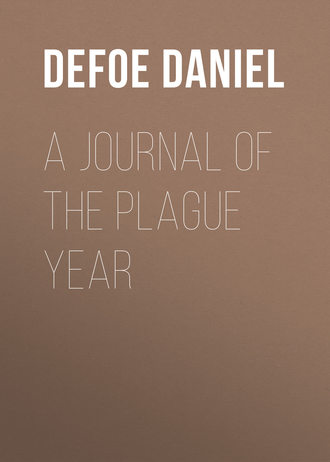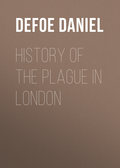
Даниэль Дефо
A Journal of the Plague Year
A certain citizen who had lived safe and untouched till the month of September, when the weight of the distemper lay more in the city than it had done before, was mighty cheerful, and something too bold (as I think it was) in his talk of how secure he was, how cautious he had been, and how he had never come near any sick body. Says another citizen, a neighbour of his, to him one day, 'Do not be too confident, Mr – ; it is hard to say who is sick and who is well, for we see men alive and well to outward appearance one hour, and dead the next.' 'That is true', says the first man, for he was not a man presumptuously secure, but had escaped a long while – and men, as I said above, especially in the city began to be over-easy upon that score. 'That is true,' says he; 'I do not think myself secure, but I hope I have not been in company with any person that there has been any danger in.' 'No?' says his neighbour. 'Was not you at the Bull Head Tavern in Gracechurch Street with Mr – the night before last?' 'Yes,' says the first, 'I was; but there was nobody there that we had any reason to think dangerous.' Upon which his neighbour said no more, being unwilling to surprise him; but this made him more inquisitive, and as his neighbour appeared backward, he was the more impatient, and in a kind of warmth says he aloud, 'Why, he is not dead, is he?' Upon which his neighbour still was silent, but cast up his eyes and said something to himself; at which the first citizen turned pale, and said no more but this, 'Then I am a dead man too', and went home immediately and sent for a neighbouring apothecary to give him something preventive, for he had not yet found himself ill; but the apothecary, opening his breast, fetched a sigh, and said no more but this, 'Look up to God'; and the man died in a few hours.
Now let any man judge from a case like this if it is possible for the regulations of magistrates, either by shutting up the sick or removing them, to stop an infection which spreads itself from man to man even while they are perfectly well and insensible of its approach, and may be so for many days.
It may be proper to ask here how long it may be supposed men might have the seeds of the contagion in them before it discovered itself in this fatal manner, and how long they might go about seemingly whole, and yet be contagious to all those that came near them. I believe the most experienced physicians cannot answer this question directly any more than I can; and something an ordinary observer may take notice of, which may pass their observations. The opinion of physicians abroad seems to be that it may lie dormant in the spirits or in the blood-vessels a very considerable time. Why else do they exact a quarantine of those who came into their harbours and ports from suspected places? Forty days is, one would think, too long for nature to struggle with such an enemy as this, and not conquer it or yield to it. But I could not think, by my own observation, that they can be infected so as to be contagious to others above fifteen or sixteen days at furthest; and on that score it was, that when a house was shut up in the city and any one had died of the plague, but nobody appeared to be ill in the family for sixteen or eighteen days after, they were not so strict but that they would connive at their going privately abroad; nor would people be much afraid of them afterward, but rather think they were fortified the better, having not been vulnerable when the enemy was in their own house; but we sometimes found it had lain much longer concealed.
Upon the foot of all these observations I must say that though Providence seemed to direct my conduct to be otherwise, yet it is my opinion, and I must leave it as a prescription, viz., that the best physic against the plague is to run away from it. I know people encourage themselves by saying God is able to keep us in the midst of danger, and able to overtake us when we think ourselves out of danger; and this kept thousands in the town whose carcases went into the great pits by cartloads, and who, if they had fled from the danger, had, I believe, been safe from the disaster; at least 'tis probable they had been safe.
And were this very fundamental only duly considered by the people on any future occasion of this or the like nature, I am persuaded it would put them upon quite different measures for managing the people from those that they took in 1665, or than any that have been taken abroad that I have heard of. In a word, they would consider of separating the people into smaller bodies, and removing them in time farther from one another – and not let such a contagion as this, which is indeed chiefly dangerous to collected bodies of people, find a million of people in a body together, as was very near the case before, and would certainly be the case if it should ever appear again.
The plague, like a great fire, if a few houses only are contiguous where it happens, can only burn a few houses; or if it begins in a single, or, as we call it, a lone house, can only burn that lone house where it begins. But if it begins in a close-built town or city and gets a head, there its fury increases: it rages over the whole place, and consumes all it can reach.
I could propose many schemes on the foot of which the government of this city, if ever they should be under the apprehensions of such another enemy (God forbid they should), might ease themselves of the greatest part of the dangerous people that belong to them; I mean such as the begging, starving, labouring poor, and among them chiefly those who, in case of a siege, are called the useless mouths; who being then prudently and to their own advantage disposed of, and the wealthy inhabitants disposing of themselves and of their servants and children, the city and its adjacent parts would be so effectually evacuated that there would not be above a tenth part of its people left together for the disease to take hold upon. But suppose them to be a fifth part, and that two hundred and fifty thousand people were left: and if it did seize upon them, they would, by their living so much at large, be much better prepared to defend themselves against the infection, and be less liable to the effects of it than if the same number of people lived close together in one smaller city such as Dublin or Amsterdam or the like.
It is true hundreds, yea, thousands of families fled away at this last plague, but then of them, many fled too late, and not only died in their flight, but carried the distemper with them into the countries where they went and infected those whom they went among for safety; which confounded the thing, and made that be a propagation of the distemper which was the best means to prevent it; and this too is an evidence of it, and brings me back to what I only hinted at before, but must speak more fully to here, namely, that men went about apparently well many days after they had the taint of the disease in their vitals, and after their spirits were so seized as that they could never escape it, and that all the while they did so they were dangerous to others; I say, this proves that so it was; for such people infected the very towns they went through, as well as the families they went among; and it was by that means that almost all the great towns in England had the distemper among them, more or less, and always they would tell you such a Londoner or such a Londoner brought it down.
It must not be omitted that when I speak of those people who were really thus dangerous, I suppose them to be utterly ignorant of their own conditions; for if they really knew their circumstances to be such as indeed they were, they must have been a kind of wilful murtherers if they would have gone abroad among healthy people – and it would have verified indeed the suggestion which I mentioned above, and which I thought seemed untrue: viz., that the infected people were utterly careless as to giving the infection to others, and rather forward to do it than not; and I believe it was partly from this very thing that they raised that suggestion, which I hope was not really true in fact.
I confess no particular case is sufficient to prove a general, but I could name several people within the knowledge of some of their neighbours and families yet living who showed the contrary to an extreme. One man, a master of a family in my neighbourhood, having had the distemper, he thought he had it given him by a poor workman whom he employed, and whom he went to his house to see, or went for some work that he wanted to have finished; and he had some apprehensions even while he was at the poor workman's door, but did not discover it fully; but the next day it discovered itself, and he was taken very in, upon which he immediately caused himself to be carried into an outbuilding which he had in his yard, and where there was a chamber over a workhouse (the man being a brazier). Here he lay, and here he died, and would be tended by none of his neighbours, but by a nurse from abroad; and would not suffer his wife, nor children, nor servants to come up into the room, lest they should be infected – but sent them his blessing and prayers for them by the nurse, who spoke it to them at a distance, and all this for fear of giving them the distemper; and without which he knew, as they were kept up, they could not have it.
And here I must observe also that the plague, as I suppose all distempers do, operated in a different manner on differing constitutions; some were immediately overwhelmed with it, and it came to violent fevers, vomitings, insufferable headaches, pains in the back, and so up to ravings and ragings with those pains; others with swellings and tumours in the neck or groin, or armpits, which till they could be broke put them into insufferable agonies and torment; while others, as I have observed, were silently infected, the fever preying upon their spirits insensibly, and they seeing little of it till they fell into swooning, and faintings, and death without pain. I am not physician enough to enter into the particular reasons and manner of these differing effects of one and the same distemper, and of its differing operation in several bodies; nor is it my business here to record the observations which I really made, because the doctors themselves have done that part much more effectually than I can do, and because my opinion may in some things differ from theirs. I am only relating what I know, or have heard, or believe of the particular cases, and what fell within the compass of my view, and the different nature of the infection as it appeared in the particular cases which I have related; but this may be added too: that though the former sort of those cases, namely, those openly visited, were the worst for themselves as to pain – I mean those that had such fevers, vomitings, headaches, pains, and swellings, because they died in such a dreadful manner – yet the latter had the worst state of the disease; for in the former they frequently recovered, especially if the swellings broke; but the latter was inevitable death; no cure, no help, could be possible, nothing could follow but death. And it was worse also to others, because, as above, it secretly and unperceived by others or by themselves, communicated death to those they conversed with, the penetrating poison insinuating itself into their blood in a manner which it is impossible to describe, or indeed conceive.
This infecting and being infected without so much as its being known to either person is evident from two sorts of cases which frequently happened at that time; and there is hardly anybody living who was in London during the infection but must have known several of the cases of both sorts.
(1) Fathers and mothers have gone about as if they had been well, and have believed themselves to be so, till they have insensibly infected and been the destruction of their whole families, which they would have been far from doing if they had the least apprehensions of their being unsound and dangerous themselves. A family, whose story I have heard, was thus infected by the father; and the distemper began to appear upon some of them even before he found it upon himself. But searching more narrowly, it appeared he had been affected some time; and as soon as he found that his family had been poisoned by himself he went distracted, and would have laid violent hands upon himself, but was kept from that by those who looked to him, and in a few days died.
(2) The other particular is, that many people having been well to the best of their own judgement, or by the best observation which they could make of themselves for several days, and only finding a decay of appetite, or a light sickness upon their stomachs; nay, some whose appetite has been strong, and even craving, and only a light pain in their heads, have sent for physicians to know what ailed them, and have been found, to their great surprise, at the brink of death: the tokens upon them, or the plague grown up to an incurable height.
It was very sad to reflect how such a person as this last mentioned above had been a walking destroyer perhaps for a week or a fortnight before that; how he had ruined those that he would have hazarded his life to save, and had been breathing death upon them, even perhaps in his tender kissing and embracings of his own children. Yet thus certainly it was, and often has been, and I could give many particular cases where it has been so. If then the blow is thus insensibly striking – if the arrow flies thus unseen, and cannot be discovered – to what purpose are all the schemes for shutting up or removing the sick people? Those schemes cannot take place but upon those that appear to be sick, or to be infected; whereas there are among them at the same time thousands of people who seem to be well, but are all that while carrying death with them into all companies which they come into.
This frequently puzzled our physicians, and especially the apothecaries and surgeons, who knew not how to discover the sick from the sound; they all allowed that it was really so, that many people had the plague in their very blood, and preying upon their spirits, and were in themselves but walking putrefied carcases whose breath was infectious and their sweat poison, and yet were as well to look on as other people, and even knew it not themselves; I say, they all allowed that it was really true in fact, but they knew not how to propose a discovery.
My friend Dr Heath was of opinion that it might be known by the smell of their breath; but then, as he said, who durst smell to that breath for his information? since, to know it, he must draw the stench of the plague up into his own brain, in order to distinguish the smell! I have heard it was the opinion of others that it might be distinguished by the party's breathing upon a piece of glass, where, the breath condensing, there might living creatures be seen by a microscope, of strange, monstrous, and frightful shapes, such as dragons, snakes, serpents, and devils, horrible to behold. But this I very much question the truth of, and we had no microscopes at that time, as I remember, to make the experiment with.
It was the opinion also of another learned man, that the breath of such a person would poison and instantly kill a bird; not only a small bird, but even a cock or hen, and that, if it did not immediately kill the latter, it would cause them to be roupy, as they call it; particularly that if they had laid any eggs at any time, they would be all rotten. But those are opinions which I never found supported by any experiments, or heard of others that had seen it; so I leave them as I find them; only with this remark, namely, that I think the probabilities are very strong for them.
Some have proposed that such persons should breathe hard upon warm water, and that they would leave an unusual scum upon it, or upon several other things, especially such as are of a glutinous substance and are apt to receive a scum and support it.
But from the whole I found that the nature of this contagion was such that it was impossible to discover it at all, or to prevent its spreading from one to another by any human skill.
Here was indeed one difficulty which I could never thoroughly get over to this time, and which there is but one way of answering that I know of, and it is this, viz., the first person that died of the plague was on December 20, or thereabouts, 1664, and in or about long Acre; whence the first person had the infection was generally said to be from a parcel of silks imported from Holland, and first opened in that house.
But after this we heard no more of any person dying of the plague, or of the distemper being in that place, till the 9th of February, which was about seven weeks after, and then one more was buried out of the same house. Then it was hushed, and we were perfectly easy as to the public for a great while; for there were no more entered in the weekly bill to be dead of the plague till the 22nd of April, when there was two more buried, not out of the same house, but out of the same street; and, as near as I can remember, it was out of the next house to the first. This was nine weeks asunder, and after this we had no more till a fortnight, and then it broke out in several streets and spread every way. Now the question seems to lie thus: Where lay the seeds of the infection all this while? How came it to stop so long, and not stop any longer? Either the distemper did not come immediately by contagion from body to body, or, if it did, then a body may be capable to continue infected without the disease discovering itself many days, nay, weeks together; even not a quarantine of days only, but soixantine; not only forty days, but sixty days or longer.
It is true there was, as I observed at first, and is well known to many yet living, a very cold winter and a long frost which continued three months; and this, the doctors say, might check the infection; but then the learned must allow me to say that if, according to their notion, the disease was (as I may say) only frozen up, it would like a frozen river have returned to its usual force and current when it thawed – whereas the principal recess of this infection, which was from February to April, was after the frost was broken and the weather mild and warm.
But there is another way of solving all this difficulty, which I think my own remembrance of the thing will supply; and that is, the fact is not granted – namely, that there died none in those long intervals, viz., from the 20th of December to the 9th of February, and from thence to the 22nd of April. The weekly bills are the only evidence on the other side, and those bills were not of credit enough, at least with me, to support an hypothesis or determine a question of such importance as this; for it was our received opinion at that time, and I believe upon very good grounds, that the fraud lay in the parish officers, searchers, and persons appointed to give account of the dead, and what diseases they died of; and as people were very loth at first to have the neighbours believe their houses were infected, so they gave money to procure, or otherwise procured, the dead persons to be returned as dying of other distempers; and this I know was practised afterwards in many places, I believe I might say in all places where the distemper came, as will be seen by the vast increase of the numbers placed in the weekly bills under other articles of diseases during the time of the infection. For example, in the months of July and August, when the plague was coming on to its highest pitch, it was very ordinary to have from a thousand to twelve hundred, nay, to almost fifteen hundred a week of other distempers. Not that the numbers of those distempers were really increased to such a degree, but the great number of families and houses where really the infection was, obtained the favour to have their dead be returned of other distempers, to prevent the shutting up their houses. For example: —

Now it was not doubted but the greatest part of these, or a great part of them, were dead of the plague, but the officers were prevailed with to return them as above, and the numbers of some particular articles of distempers discovered is as follows: —

There were several other articles which bore a proportion to these, and which, it is easy to perceive, were increased on the same account, as aged, consumptions, vomitings, imposthumes, gripes, and the like, many of which were not doubted to be infected people; but as it was of the utmost consequence to families not to be known to be infected, if it was possible to avoid it, so they took all the measures they could to have it not believed, and if any died in their houses, to get them returned to the examiners, and by the searchers, as having died of other distempers.
This, I say, will account for the long interval which, as I have said, was between the dying of the first persons that were returned in the bill to be dead of the plague and the time when the distemper spread openly and could not be concealed.
Besides, the weekly bills themselves at that time evidently discover the truth; for, while there was no mention of the plague, and no increase after it had been mentioned, yet it was apparent that there was an increase of those distempers which bordered nearest upon it; for example, there were eight, twelve, seventeen of the spotted fever in a week, when there were none, or but very few, of the plague; whereas before, one, three, or four were the ordinary weekly numbers of that distemper. Likewise, as I observed before, the burials increased weekly in that particular parish and the parishes adjacent more than in any other parish, although there were none set down of the plague; all which tells us, that the infection was handed on, and the succession of the distemper really preserved, though it seemed to us at that time to be ceased, and to come again in a manner surprising.
It might be, also, that the infection might remain in other parts of the same parcel of goods which at first it came in, and which might not be perhaps opened, or at least not fully, or in the clothes of the first infected person; for I cannot think that anybody could be seized with the contagion in a fatal and mortal degree for nine weeks together, and support his state of health so well as even not to discover it to themselves; yet if it were so, the argument is the stronger in favour of what I am saying: namely, that the infection is retained in bodies apparently well, and conveyed from them to those they converse with, while it is known to neither the one nor the other.
Great were the confusions at that time upon this very account, and when people began to be convinced that the infection was received in this surprising manner from persons apparently well, they began to be exceeding shy and jealous of every one that came near them. Once, on a public day, whether a Sabbath-day or not I do not remember, in Aldgate Church, in a pew full of people, on a sudden one fancied she smelt an ill smell. Immediately she fancies the plague was in the pew, whispers her notion or suspicion to the next, then rises and goes out of the pew. It immediately took with the next, and so to them all; and every one of them, and of the two or three adjoining pews, got up and went out of the church, nobody knowing what it was offended them, or from whom.
This immediately filled everybody's mouths with one preparation or other, such as the old woman directed, and some perhaps as physicians directed, in order to prevent infection by the breath of others; insomuch that if we came to go into a church when it was anything full of people, there would be such a mixture of smells at the entrance that it was much more strong, though perhaps not so wholesome, than if you were going into an apothecary's or druggist's shop. In a word, the whole church was like a smelling-bottle; in one corner it was all perfumes; in another, aromatics, balsamics, and variety of drugs and herbs; in another, salts and spirits, as every one was furnished for their own preservation. Yet I observed that after people were possessed, as I have said, with the belief, or rather assurance, of the infection being thus carried on by persons apparently in health, the churches and meeting-houses were much thinner of people than at other times before that they used to be. For this is to be said of the people of London, that during the whole time of the pestilence the churches or meetings were never wholly shut up, nor did the people decline coming out to the public worship of God, except only in some parishes when the violence of the distemper was more particularly in that parish at that time, and even then no longer than it continued to be so.
Indeed nothing was more strange than to see with what courage the people went to the public service of God, even at that time when they were afraid to stir out of their own houses upon any other occasion; this, I mean, before the time of desperation, which I have mentioned already. This was a proof of the exceeding populousness of the city at the time of the infection, notwithstanding the great numbers that were gone into the country at the first alarm, and that fled out into the forests and woods when they were further terrified with the extraordinary increase of it. For when we came to see the crowds and throngs of people which appeared on the Sabbath-days at the churches, and especially in those parts of the town where the plague was abated, or where it was not yet come to its height, it was amazing. But of this I shall speak again presently. I return in the meantime to the article of infecting one another at first, before people came to right notions of the infection, and of infecting one another. People were only shy of those that were really sick, a man with a cap upon his head, or with clothes round his neck, which was the case of those that had swellings there. Such was indeed frightful; but when we saw a gentleman dressed, with his band on and his gloves in his hand, his hat upon his head, and his hair combed, of such we had not the least apprehensions, and people conversed a great while freely, especially with their neighbours and such as they knew. But when the physicians assured us that the danger was as well from the sound (that is, the seemingly sound) as the sick, and that those people who thought themselves entirely free were oftentimes the most fatal, and that it came to be generally understood that people were sensible of it, and of the reason of it; then, I say, they began to be jealous of everybody, and a vast number of people locked themselves up, so as not to come abroad into any company at all, nor suffer any that had been abroad in promiscuous company to come into their houses, or near them – at least not so near them as to be within the reach of their breath or of any smell from them; and when they were obliged to converse at a distance with strangers, they would always have preservatives in their mouths and about their clothes to repel and keep off the infection.
It must be acknowledged that when people began to use these cautions they were less exposed to danger, and the infection did not break into such houses so furiously as it did into others before; and thousands of families were preserved (speaking with due reserve to the direction of Divine Providence) by that means.
But it was impossible to beat anything into the heads of the poor. They went on with the usual impetuosity of their tempers, full of outcries and lamentations when taken, but madly careless of themselves, foolhardy and obstinate, while they were well. Where they could get employment they pushed into any kind of business, the most dangerous and the most liable to infection; and if they were spoken to, their answer would be, 'I must trust to God for that; if I am taken, then I am provided for, and there is an end of me', and the like. Or thus, 'Why, what must I do? I can't starve. I had as good have the plague as perish for want. I have no work; what could I do? I must do this or beg.' Suppose it was burying the dead, or attending the sick, or watching infected houses, which were all terrible hazards; but their tale was generally the same. It is true, necessity was a very justifiable, warrantable plea, and nothing could be better; but their way of talk was much the same where the necessities were not the same. This adventurous conduct of the poor was that which brought the plague among them in a most furious manner; and this, joined to the distress of their circumstances when taken, was the reason why they died so by heaps; for I cannot say I could observe one jot of better husbandry among them, I mean the labouring poor, while they were all well and getting money than there was before, but as lavish, as extravagant, and as thoughtless for tomorrow as ever; so that when they came to be taken sick they were immediately in the utmost distress, as well for want as for sickness, as well for lack of food as lack of health.
This misery of the poor I had many occasions to be an eyewitness of, and sometimes also of the charitable assistance that some pious people daily gave to such, sending them relief and supplies both of food, physic, and other help, as they found they wanted; and indeed it is a debt of justice due to the temper of the people of that day to take notice here, that not only great sums, very great sums of money were charitably sent to the Lord Mayor and aldermen for the assistance and support of the poor distempered people, but abundance of private people daily distributed large sums of money for their relief, and sent people about to inquire into the condition of particular distressed and visited families, and relieved them; nay, some pious ladies were so transported with zeal in so good a work, and so confident in the protection of Providence in discharge of the great duty of charity, that they went about in person distributing alms to the poor, and even visiting poor families, though sick and infected, in their very houses, appointing nurses to attend those that wanted attending, and ordering apothecaries and surgeons, the first to supply them with drugs or plasters, and such things as they wanted; and the last to lance and dress the swellings and tumours, where such were wanting; giving their blessing to the poor in substantial relief to them, as well as hearty prayers for them.







